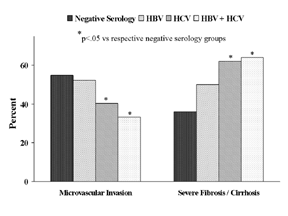HEPATITIS SEROLOGY DEFINES TUMOR AND LIVER DISEASE CHARACTERISTICS BUT NOT PROGNOSIS AFTER RESECTION OF HEPATOCELLULAR CARCINOMA
Publishing Number: 280
Timothy M. Pawlik, Ronnie Tung-Ping Poon, Eddie Abdalla, J. M. Sarmiento, Iwao Ikai, David Nagorney, Jacques Belghiti, Yoshio Yamaoka, Gregory Lauwers, Jean-Nicolas Vauthey, University of Texas, M. D. Anderson Cancer Center, Houston, TX, Department of Surgery, Queen Mary Hospital, Hong Kong, China, Mayo Clinic, Rochester, MN, Kyoto University, Kyoto, Japan, Beaujon Hospital, Paris, France, Massachusetts General Hospital, Boston, MA
Background: The impact of hepatitis B (HBV) and C (HCV) serology on survival after resection of hepatocellular carcinoma (HCC) is controversial. Method: 446 patients who underwent hepatic resection for HCC with complete HBV and HCV serology were identified from a multicenter institutional database. Tumor and liver characteristics and risk factors for survival were evaluated. Results: 126 patients had negative serology (28.3%), 163 HBV (36.5%), 79 HCV (17.7%), and 78 HBV+HCV (17.5%). HBV vs. HCV vs. HBV+HCV did not predict tumor grade or multicentricity (p>.05). Those with HCV or HBV+HCV had a lower incidence of vascular invasion but worse fibrosis than patients with negative or HBV serology(p<.05). In contrast, patients with negative or HBV serology had less fibrosis but more vascular invasion compared to patients with HCV or HBV+HCV (p<.001)(Figure). Median survival was 48 months (median follow-up 33 months, range 0.2 to 143). Presence of hepatitis did not significantly impact long-term survival (negative serology, median 49; HBV 41; HCV 51; HBV+HCV 61 months, p=NS). The subset with tumors < 5 cm had no difference in survival based on hepatitis status (p=NS). On multivariate analysis, hepatic fibrosis (HR=2.2; p<.001) and microvascular invasion (HR=1.9; p<.001) predicted decreased survival. Conclusion: Prognosis after resection of HCC is influenced by tumor factors and liver disease but not hepatitis infection. These data suggest that treatment for HCC should be dictated by the extent of underlying liver disease rather than hepatitis serology.

 500 Cummings Center
500 Cummings Center +1 978-927-8330
+1 978-927-8330
 +1 978-524-0461
+1 978-524-0461